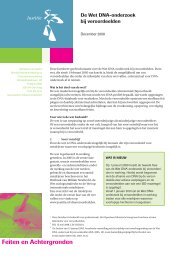INTERPOL HANDBOOK ON DNA DATA EXCHANGE AND PRACTICE
INTERPOL HANDBOOK ON DNA DATA EXCHANGE AND PRACTICE
INTERPOL HANDBOOK ON DNA DATA EXCHANGE AND PRACTICE
You also want an ePaper? Increase the reach of your titles
YUMPU automatically turns print PDFs into web optimized ePapers that Google loves.
Strict and stringent laws should be in place to prevent any misuse of <strong>DNA</strong> informationso that discrimination based on racial, ethnic, religious or health reasons is not permittedby insurers, employers, law-enforcement agencies or anyone else concerned.• conclusionThe rights and welfare of an individual should be balanced against the interests ofsociety. It is the responsibility of the government to ensure that human dignity andhuman rights are protected when dealing with human genetic data. Equality, justice andprivacy legislation should conform to international laws on human rights and should bereferred to when genetic data is involved. <strong>DNA</strong> databasing legislation and policy shouldobserve and consider international instruments, such as:• Universal Declaration of Human Rights (1948) 6• United Nations Educational, Scientific and Cultural Organization (UNESCO),Universal Declaration on the Human Genome and Human Rights (1997) 7• UNESCO International Declaration on Human Genetic Data (2003) 8• UNESCO Universal Declaration on Bioethics and Human Rights (2005) 9PAGE 66PRIVACY <strong>AND</strong> <strong>DATA</strong> PROTECTI<strong>ON</strong>







